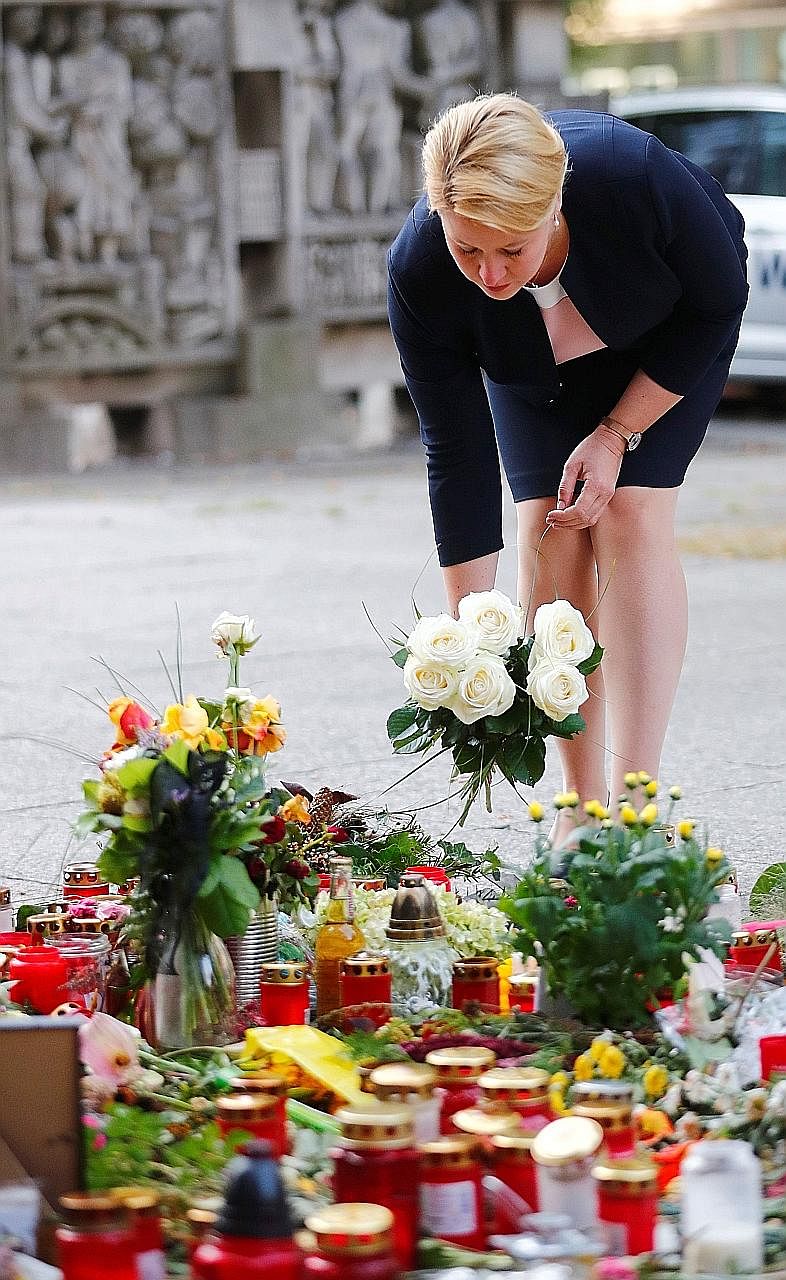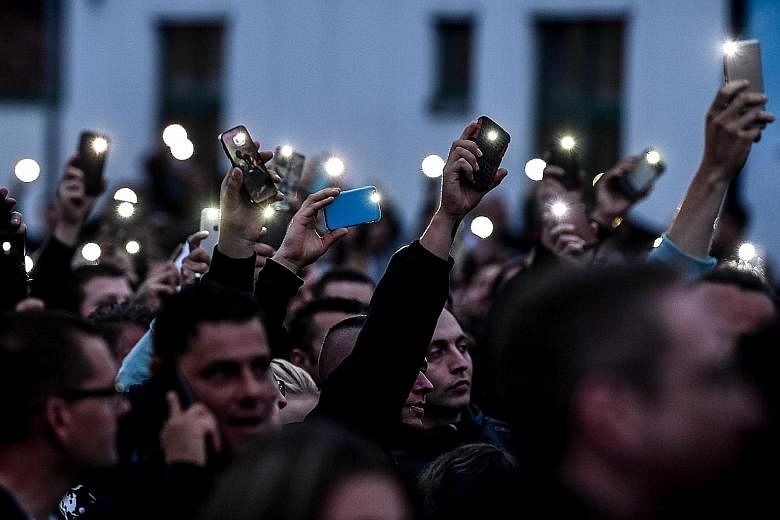CHEMNITZ (Germany) • Waving German flags, the angry mob, with some flashing Nazi salutes, made its way through the streets, chasing dark-skinned bystanders as police officers, vastly outnumbered, were too afraid to intervene.
Mr Anas al-Nahlawie, a Syrian refugee and father of two, watched, horrified, from a friend's fourth-floor balcony. They were hunting in packs for immigrants just like him, he said. "Like wolves."
For a few perilous hours over two days earlier this week, the mob owned the streets of Chemnitz, where anger exploded after word spread that an Iraqi and a Syrian asylum seeker were suspects in a knife attack that killed a German man early on Sunday.
Chemnitz, a city of some 250,000 in eastern Germany, has a history of neo-Nazi protests. Usually, such protests draw a few hundred people from the fringes of society - and far larger counter-demonstrations, city officials say. The crowd this time was 8,000-strong. Led by several hundred identifiable neo-Nazis, the protest appeared to be joined by thousands of ordinary citizens. More marches have been planned for today.
The city had never seen anything like this - and, to some degree, neither had post-World War II Germany. The rampage now stands as a high-water mark in the outpouring of anti-immigrant hatred that has swelled as Germany struggles to absorb the nearly one million asylum seekers who arrived in the country after Chancellor Angela Merkel decided to open the borders in 2015.
That decision sharply divided Germany, with critics soon arguing that Dr Merkel's administration has lost control of the situation. Three years later, what the government is struggling to control is an anti-immigrant backlash.

Neo-Nazis are growing bolder and stronger, and they are better organised, say officials and sociologists.
The far-right Alternative for Germany (AfD) party is a growing power in Parliament - another shock to the system - and has started to normalise angry sentiments about immigrants that would not have been uttered aloud before, bringing them into the mainstream.
In the face of this newly assertive far right, Chemnitz has become a test of state authority. Some say it has even become a test of Germany's post-war democracy.
"They are challenging our democratic state in a way they have not done before," said Chemnitz Mayor Barbara Ludwig, a Social Democrat, sitting in her second-floor City Hall office one recent morning. "We must pass this test."
That is precisely what the groups behind this week's disorder see: a pivotal moment they want to use to change the direction of Germany.
Mr Benjamin Jahn Zschocke, 32, a leading member of Pro Chemnitz, the nationalist citizens' movement that registered Monday's march, described the week's events as a turning point.
"People were sick of the system then and now, they are sick of the system again," he said, adding that he had never voted and did not believe in parliamentary democracy.
Neo-Nazis have a long tradition of holding demonstrations in Chemnitz, Ms Ludwig mayor said. For years, they would take to the streets on March 5, mourning the day the city was bombed by Allied forces in 1945. "But they were always in the hundreds and the counter-demonstration was always bigger," she added.
This week was different. "This mix of far-right extremists and AfD voters was new," said Dr Hajo Funke, a political scientist at the Free University of Berlin and a veteran expert of the far right.
In last year's national election, the AfD garnered 27 per cent of the votes in the eastern state of Saxony, where Chemnitz is located. Empowered by that success, far-right activists have been able to channel the fears and discontent of voters and, often using social media, mobilise crowds that a few years ago would have been unthinkable, Dr Funke said.
"We have a strong neo-Nazi scene in eastern Germany, but we also have a strong current of far-right extremism in all of Germany - not just in Parliament but in society," said Dr Matthias Quent, who runs an institute that studies democracy and civil society.
Social media played a significant role in mobilising the mobs.
Within hours of the stabbing on Sunday, soccer hooligans with links to neo-Nazis posted an appeal online, saying: "Let's show together who has the say in this city."
Soon, rumours started circulating. The victim had been defending a woman who had been molested by the killer. A second victim had died in hospital. Neither was true.
But within a few hours, some 800 protesters were on the streets, outnumbering the police 10 to one. On Monday, the number of protesters grew tenfold, again catching the police unprepared and making national headlines with riotous scenes of street battles.
Another march on Thursday was much smaller, and largely calm, after the local police were reinforced with federal units.
The feeling of insecurity was palpable this week in Chemnitz. At the scene of Sunday's murder, a stone's throw from City Hall, Mr Wolfgang Grosser, 61, and his wife, Sabine, were lighting a candle for the victim, who was their son's friend. "He did not deserve this," Mr Grosser said. "He was the nicest possible human being." "We don't feel safe in our own city any more," he said to the bitter nods of bystanders.
NYTIMES

